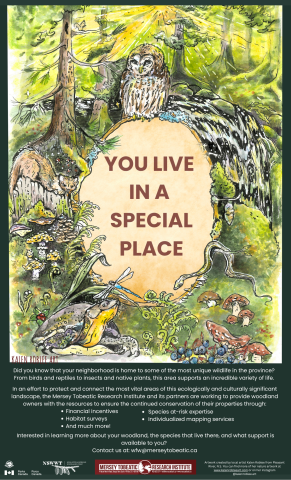
Ecological corridors help maintain the integrity of ecosystems and function as bridges between protected and conserved areas. By promoting the coexistence of humans and wildlife, corridors connect important habitats on private woodlands with existing protected and conserved areas. MTRI is working with local rightsholders, Wasoqopa'q First Nation (WFN), land stewards, and partners including the Nova Scotia Working Woodlands Trust (NSWWT) and the Nova Scotia Nature Trust, to support connectivity initiatives within the region. There are several ways to become involved:
MTRI offers financial incentives to woodland stewards who wish to help protect some of the province’s most at-risk species through its Woodlands for Wildlife program. Woodlands for Wildlife applies to woodlands that contain known habitat for at-risk birds, reptiles, lichens, and tree species and provides participants with habitat surveys, species at risk expertise, and individualized mapping services.
NSWWT offers Working Forest Easements to help woodland owners protect the long-term health of their forests while supporting sustainable forest management. NSWWT also offers land stewards the opportunity to leave a lasting impact by donating or selling their land for conservation.
This project is funded by Parks Canada's National Program for Ecological Corridors.
See our Ecological Corridors pamphlet, designed by local artist, Kalen Roblee. You can find more of her nature artwork at or on her instagram @kalenroblee.art
For more information or to become involved in the local connectivity conversation, contact: Abby.Lewis@MerseyTobeatic.ca
